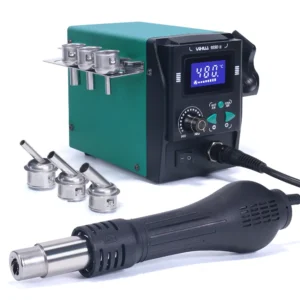Soldering Accessories
Welcome to Neo Soldering!
Whether one is a hobbyist or a professional, possessing the appropriate soldering accessories can significantly impact the quality of the results achieved.
Showing all 7 results
-
Cordless Soldering Iron, Soldering Accessories, Soldering Gun, Soldering Iron, Soldering Iron Kits, Soldering Iron Tips
£34.90 – £44.90 Select options This product has multiple variants. The options may be chosen on the product page -
Soldering Accessories, Soldering Iron Kits, Soldering Stations, YIHUA -Soldering Equipment
Original price was: £159.00.£129.00Current price is: £129.00. Add to cart -
Soldering Accessories, Soldering Iron Kits, Soldering Stations, YIHUA -Soldering Equipment
Original price was: £89.00.£79.00Current price is: £79.00. Add to cart -
Soldering Accessories, Soldering Iron, Soldering Iron Kits, Soldering Wire, YIHUA -Soldering Equipment
Original price was: £22.90.£19.90Current price is: £19.90. Add to cart -
Soldering Accessories, Soldering Iron, Soldering Iron Kits, YIHUA -Soldering Equipment
Original price was: £17.90.£14.90Current price is: £14.90. Add to cart -
Soldering Accessories, YIHUA -Soldering Equipment
£33.51 – £33.64 Select options This product has multiple variants. The options may be chosen on the product page -
YIHUA -Soldering Equipment, Hot Air Stations, Soldering Accessories
£61.58 – £63.13 Select options This product has multiple variants. The options may be chosen on the product page
Types of Soldering Accessories
Soldering accessories enhance the quality and ease of soldering. Essential tools include soldering irons, soldering stations, tips, soldering flux, and solder wire, along with desoldering pumps and heat guns for effective repair and assembly tasks.
Soldering Irons
Soldering irons apply controlled heat to melt solder and form secure connections. Available in basic fixed-temperature models or advanced digital versions, selecting the right soldering iron involves considering wattage, tip shape, and temperature range to match your project’s needs.
Maintenance Tips:
- Regularly clean the tips.
- Store properly to extend lifespan.
Soldering Stations
Soldering stations offer controlled heating, stability, and improved safety compared to standalone irons. Typically featuring adjustable temperature controls, digital displays, and quick heating, these stations ensure precision and minimize damage to sensitive components.
Key Benefits:
- Adjustable temperature settings
- Built-in safety features
- Enhanced solder joint quality
Soldering Tips
Choosing the right soldering tip significantly impacts solder joint quality. Tips vary from fine points for precision tasks to broader chisel shapes for larger connections. Regular cleaning and tinning extend tip life and maintain efficiency.
Tip Selection:
- Chisel Tips: Large joints, effective heat transfer.
- Conical Tips: Precision tasks in tight spaces.
Soldering Flux
Flux facilitates smooth solder flow, prevents oxidation, and improves joint quality. Different types include rosin flux for general electronics and water-soluble flux for applications demanding clean residue removal.
Flux Types:
- Rosin Flux: Efficient, leaves residue requiring cleaning.
- Water-Soluble Flux: Easy residue removal, cleanliness-focused.
Soldering Wire
Solder wire, available in lead-free and leaded versions, creates durable connections. Selecting appropriate solder involves considering project needs, environmental regulations, and wire gauge.
Selection Factors:
- Leaded Solder: Easy flow, ideal for intricate tasks.
- Lead-Free Solder: Environmentally friendly, various alloys available.
Common Applications of Soldering
Soldering is widely used for DIY electronics, professional repairs, PCB assembly, and prototyping. Applications range from simple LED kits to repairing complex devices like amplifiers and gaming consoles.
Typical Projects:
- LED displays
- Audio equipment
- Electronics repairs
Safety Considerations
Adhering to safety measures is essential to prevent injury. Always use protective goggles, heat-resistant gloves, and ensure good ventilation or fume extraction during soldering.
Protective Gear Recommendations:
- Soldering goggles
- Heat-resistant gloves
- Fume extractors
Tips for Choosing Soldering Accessories
When selecting soldering tools, consider task complexity, experience level, and project materials. Beginners benefit from comprehensive kits, while professionals may prefer specialized equipment for greater versatility.
Selection Factors:
- Project type and requirements
- User experience level
- Materials involved
Choose the right soldering accessories to ensure successful, efficient, and safe outcomes for all your electronic projects.
Showing all 7 results







